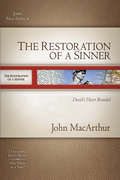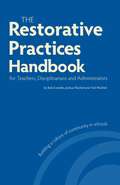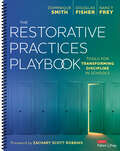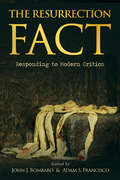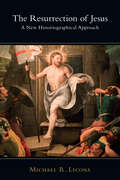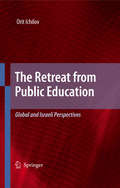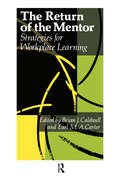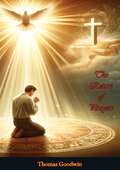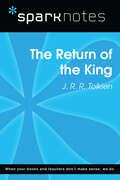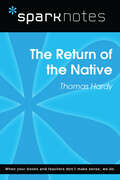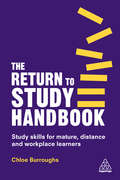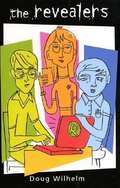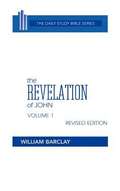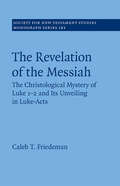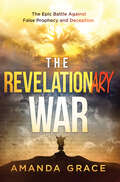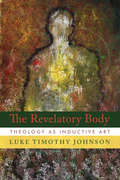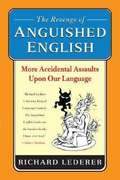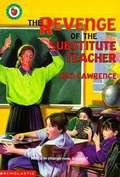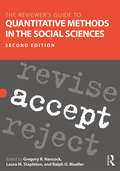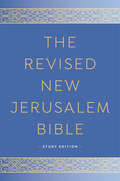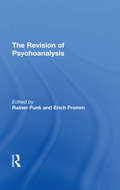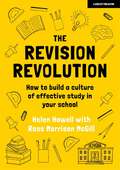- Table View
- List View
The Restoration of a Sinner: David's Heart Revealed (MacArthur Old Testament Study Guides)
by John MacarthurMacArthur Old Testament Study Guide Series, Volume 7A Study in 2 SamuelDavid is known as Israel's greatest king, and he was renowned for his courage. But David was not a super-hero. He had to fight many difficult battles in order to establish his throne, he committed murder and adultery, and he brought disaster upon his family. Far from perfect, David was a man with sin who depended on the same grace of God that is available to us as well. Despite his all-too-human failings, the Lord declared that David was a man after God's own heart. The Restoration of a Sinner takes an in-depth look at the historical period beginning with David's struggle to establish his throne, continuing through his sin and repentance, and concluding with the tragic rebellion of his son Absalom. Studies include close-ups of Joab, Amnon, and Tamar, and others, as well as careful considerations of doctrinal themes, such as "Keeping God First" and "The Man After God's Own Heart." This twelve-volume MacArthur Old Testament Study Guide series provides intriguing twelve-week examinations of the Old Testament. Each guide looks at a portion of Scripture from three perspectives--historical studies, character studies, and thematic studies--and incorporates extensive commentary, detailed observations on overriding themes, and probing questions to help you study the Old Testament with guidance from John MacArthur.
The Restorative Practices Handbook for Teachers, Disciplinarians and Administrators
by Bob Costello Joshua Wachtel Ted WachtelThis is a practical guide for teachers who want to instill restorative practices in their students.
The Restorative Practices Playbook: Tools for Transforming Discipline in Schools
by Douglas Fisher Nancy Frey Dominique SmithUtilize restorative practices to create a safe, accepting, and equitable school climate where learning can flourish. When students have unfinished learning, educators create opportunities for students to learn. Unfortunately, this role seems to end when it comes to behavior. How can we turn behavior into a teachable moment? The Restorative Practices Playbook details a set of practices designed to teach prosocial behaviors based on strong relationships and a commitment to the well-being of others. Implementing restorative practices establishes a positive academic and social-emotional learning environment while building students’ capacity to self-regulate, make decisions, and self-govern—the very skills students need to achieve. In this eye-opening, essential playbook, renowned educators Dominique Smith, Douglas Fisher, and Nancy Frey support educators with the reflection prompts, tools, examples, and strategies needed to create restorative practices around several key concepts: A restorative school culture, grounded in respect, that builds agency and identity, establishes teacher credibility, sets high expectations, and fosters positive relationships Restorative conversations that equip adults and students with the capacity to resolve problems, make decisions, and arrive at solutions in ways that are satisfactory and growth-producing Restorative circles that promote academic learning through dialogue, build consensus in decision making, and help participants reach resolution through healing Formal restorative conferences that foster guided dialogue between victim(s) and offender(s) and include plans for re-entry into the school community By becoming adept in the skillful use of restorative practices, educators will foster equitable discipline that reduces exclusion and creates a school community driven by relationships and respect.
The Restorative Practices Playbook: Tools for Transforming Discipline in Schools
by Douglas Fisher Nancy Frey Dominique SmithUtilize restorative practices to create a safe, accepting, and equitable school climate where learning can flourish. When students have unfinished learning, educators create opportunities for students to learn. Unfortunately, this role seems to end when it comes to behavior. How can we turn behavior into a teachable moment? The Restorative Practices Playbook details a set of practices designed to teach prosocial behaviors based on strong relationships and a commitment to the well-being of others. Implementing restorative practices establishes a positive academic and social-emotional learning environment while building students’ capacity to self-regulate, make decisions, and self-govern—the very skills students need to achieve. In this eye-opening, essential playbook, renowned educators Dominique Smith, Douglas Fisher, and Nancy Frey support educators with the reflection prompts, tools, examples, and strategies needed to create restorative practices around several key concepts: A restorative school culture, grounded in respect, that builds agency and identity, establishes teacher credibility, sets high expectations, and fosters positive relationships Restorative conversations that equip adults and students with the capacity to resolve problems, make decisions, and arrive at solutions in ways that are satisfactory and growth-producing Restorative circles that promote academic learning through dialogue, build consensus in decision making, and help participants reach resolution through healing Formal restorative conferences that foster guided dialogue between victim(s) and offender(s) and include plans for re-entry into the school community By becoming adept in the skillful use of restorative practices, educators will foster equitable discipline that reduces exclusion and creates a school community driven by relationships and respect.
The Resurrection Fact: Responding to Modern Critics
by Adam S Francisco John J BombaroIn the first century, the resurrection fact faced both Jewish and Greek audiences with a challenge, the challenge of a new reality: Christ, the risen Lord. Since facts are by definition"something that happened" and this happening was witnessed, proclaimed, and recorded, the fact stands for all generations.In answering critics, a defense of the resurrection consists not only of a response by way of negation (e.g., Christianity is not this), but also through positive affirmations (this is Christianity). In this book, the reader will find both. However, it is our hope that the final word retained would be the one that stands for something rather than against something.Together, our words stand for something positive, not negative namely the good news that the one true God has now taken charge of the world, in and through Jesus and His death and resurrection.
The Resurrection of Jesus: A New Historiographical Approach
by Michael R. LiconaThe question of the historicity of Jesus' resurrection has been repeatedly probed, investigated and debated. And the results have varied widely. Perhaps some now regard this issue as the burned-over district of New Testament scholarship. Could there be any new and promising approach to this problem? Yes, answers Michael Licona. And he convincingly points us to a significant deficiency in approaching this question: our historiographical orientation and practice. So he opens this study with an extensive consideration of historiography and the particular problem of investigating claims of miracles. This alone is a valuable contribution. But then Licona carefully applies his principles and methods to the question of Jesus' resurrection. In addition to determining and working from the most reliable sources and bedrock historical evidence, Licona critically weighs other prominent hypotheses. His own argument is a challenging and closely argued case for the historicity of the resurrection of Jesus, the Christ. Any future approaches to dealing with this "prize puzzle" of New Testament study will need to be routed through The Resurrection of Jesus.
The Retreat from Public Education
by Orit IchilovThe purpose of this book is to provide a comprehensive analysis of the universal elements which characterize markets in education without focusing on any particular country. This includes the examination of the social conditions that facilitate the invasion of all public spaces by the free market, analysis of the various education policies and practices that embody privatization of education, and most importantly, exploring the educational and social consequences of markets in education. Secondly, the book examines the process of the building of the public education system in Israel, and analyze the retreat from it in recent years. The Israeli public (or state) education system emerged shortly after the establishment of the state in 1948. This case study provides a unique opportunity to closely examine the significance of public schooling in the process of nation-building, and in the building of a democracy. This represents a pioneering attempt to study the rise and fall of state education in Israel.
The Return Of The Mentor: Strategies For Workplace Learning
by Brian J. Caldwell Earl M.A. CarterThis is a book on the good practice of mentoring written by scholars and practitioners in education, health and industry. It considers the roles of the mentor-mentee in changing workplaces affected by external forces including technology, the economy and the dismantling of middle- management structures, and offers guidelines for those who seek good practice, and the nurturing of the individual in a caring and collaborative culture.; A brief history of mentoring and its subsequent usage is presented, with special attention paid to the gender issues. New concepts such as "shadowing" and "reflective interviewing" are introduced and explained, and strategies are presented in such a way that they can be applied and adapted in any setting. The whole process, therefore, aims to empower the professional in a school, university or industrial level, and with others, towards a more effective and perceptive practice.; All those involved in education and training of individuals at a school, college or industrial level training will find this useful.
The Return of Prayers: The Tidings Of Peace; And The Folly Of Relapsing (classic Reprint)
by Thomas GoodwinDelve into the profound and transformative practice of prayer with Thomas Goodwin's classic work, The Return of Prayers. This insightful book offers a deep exploration of how God responds to the prayers of the faithful, providing readers with a richer understanding of the dynamics of prayer and divine intervention.Thomas Goodwin, a renowned Puritan theologian and preacher, brings his extensive biblical knowledge and spiritual wisdom to this thoughtful examination of prayer. The Return of Prayers addresses the vital question of how and when God answers the petitions of His people, shedding light on the mysterious and often misunderstood process of divine response.In this timeless work, Goodwin discusses the various ways in which prayers are returned, including immediate answers, delayed responses, and answers that come in unexpected forms. He offers practical advice on how believers can recognize and discern God's answers to their prayers, encouraging them to remain patient, faithful, and attentive to God's will.Goodwin's writing is grounded in Scripture, with extensive references to biblical examples of answered prayer. He draws from the experiences of key figures in the Bible, such as Abraham, Moses, David, and the apostles, illustrating how their prayers were returned by God in powerful and meaningful ways.The Return of Prayers also explores the conditions and attitudes that make prayers more effective, emphasizing the importance of sincerity, humility, and perseverance. Goodwin's pastoral heart shines through as he offers comfort and encouragement to those who struggle with unanswered prayers, reminding them of God's faithfulness and sovereign wisdom.Join Goodwin on a journey into the heart of prayer, and discover the profound truths about how God returns the prayers of His faithful. The Return of Prayers is a timeless exploration of faith, patience, and the wondrous ways in which God responds to the cries of His people.
The Return of the King (SparkNotes Literature Guide Series)
by SparkNotesThe Return of the King (SparkNotes Literature Guide) by J.R.R. Tolkien Making the reading experience fun! Created by Harvard students for students everywhere, SparkNotes is a new breed of study guide: smarter, better, faster. Geared to what today's students need to know, SparkNotes provides: *Chapter-by-chapter analysis *Explanations of key themes, motifs, and symbols *A review quiz and essay topicsLively and accessible, these guides are perfect for late-night studying and writing papers
The Return of the Native (SparkNotes Literature Guide Series)
by SparkNotesThe Return of the Native (SparkNotes Literature Guide) by Thomas Hardy Making the reading experience fun! Created by Harvard students for students everywhere, SparkNotes is a new breed of study guide: smarter, better, faster. Geared to what today's students need to know, SparkNotes provides: *Chapter-by-chapter analysis *Explanations of key themes, motifs, and symbols *A review quiz and essay topicsLively and accessible, these guides are perfect for late-night studying and writing papers
The Return to Study Handbook: Study Skills for Mature, Distance, and Workplace Learners
by Chloe BurroughsHave you learned how to learn? Written especially for professional or distance learners, part-time or mature students, and formal CPD qualification candidates, The Return to Study Handbook will teach you how to study effectively, ace your ongoing education, and get the grades you need to advance in your career. Whether you need to balance your learning with full or part-time work, or overcome the 'mindset gremlins' stemming from a negative school experience, this book will empower you to effectively manage your own learning and provide you with the full range of mental and practical skills you need to succeed.Packed with practical tools, tips, exercises, case studies and strategies, plus the author's own inspirational story, The Return to Study Handbook not only covers the study skills necessary for any student to be successful - such as effective note-taking; exam technique; and essay writing - but it specifically addresses relevant topics for non-traditional students. With advice on recommended technology aids; handling procrastination and distractions; dealing with overwhelm and avoiding burnout; managing distance learning; and overcoming the mental and emotional barriers of past experiences, this book will guide you through everything you need to achieve the grades and career you want.
The Revealers
by Doug WilhelmThrowing light on a dark problem: Parkland Middle School is a place the students call Darkland, because no one in it does much to stop the daily harassment of kids by other kids. <P><P>Three bullied seventh graders use their smarts to get the better of their tormentors by starting an unofficial e-mail forum at school in which they publicize their experiences. <P>Unexpectedly, lots of other kids come forward to confess their similar troubles, and it becomes clear that the problem at their school is bigger than anyone knew. <P>The school principal wants to clamp down on the operation, which she does when the trio, in their zealousness for revenge, libel a fellow student in what turns out to have been a setup. <P>Now a new plan of attack is needed ... <P>This suspenseful story of computer-era underground rebellion offers fresh perspectives on some of the most enduring themes in fiction for young readers.
The Revelation of John, Volume 1 (Chapters 1 to #5)
by William BarclayIn this and its companion volume, Dr. Barclay makes the most difficult book in the Bible easier to understand. In his introduction he examines areas such as the characteristics of apocalyptic literature and the nature of Caesar worship, John was, as Dr. Barclay shows, "soaked and saturated" in the Old Testament, and most of the imagery he employs is drawn from that source. Dr. Barclay does more than clarify the meaning of the imagery. His commentary covers many interesting subjects, such as the seven gifts of the Holy Spirit, the probable facts about John exile on the island, and the meaning of Christ's knocking at the door.
The Revelation of the Messiah: The Christological Mystery of Luke 1-2 and Its Unveiling in Luke-Acts (Society for New Testament Studies Monograph Series #181)
by Caleb FriedemanIn the first two chapters of Luke, characters acknowledge Jesus as Messiah, Son of God, and Lord. Lukan characters also speak of John going before the Lord God, suggesting that Jesus might be the Lord in view, and connect Jesus with Old Testament YHWH passages. These features have made Luke 1-2 a key locus for discussions of Lukan Christology, generating speculation as to whether Luke presents Jesus as divine. However, they also create an apparent incongruity with the body of the Gospel. In Luke 3 and elsewhere, human characters are initially ignorant that Jesus is Messiah, Son of God, and Lord. Moreover, Jesus' divinity – if Luke affirms it – does not seem to be recognized until after the resurrection. In this study, Caleb Friedeman advances a new model for understanding the Christological relationship between Luke 1-2 and the rest of Luke-Acts, in which Luke presents these opening chapters as a Christological mystery.
The Revelationary War: The Epic Battle Against False Prophecy and Deception
by Amanda GraceWe are actively mistaking false prophets for prophetic ministers. While reading this book, you will have the confidence to listen to the Lord without fear of misdirection. You also will have the tools to assess and test prophecies, knowing whether they are traps from Satan or truths from Christ. In The Revelationary War, Amanda Grace presents a constructive, confrontational warning for today&’s Christians. Now more than ever, the body of Christ needs to be discerning of what is true and what is false. With contributions from Donné Clement Petruska, daughter of the late prophet Kim Clement, this powerful book provides an understanding of where we are in the modern prophetic movement and why counterfeits ministries have risen up, along with timely biblical solutions, including how to: Hear from God and accurately use your prophetic gift Identify the telltale signs of false prophets and recognize true prophecy when you hear it Avoid con artists, psychics, witchcraft, and divination disguised as prophetic or deliverance ministries Let Amanda Grace be your trusted guide as you learn to distinguish between messages from heaven and those tainted by earthly, occultic, or other influences. Only when we learn to recognize Satan&’s counterfeits and build our lives on unshakeable truth can we thrive in victory during days of darkness and compromise
The Revelatory Body: Theology as Inductive Art
by Luke Timothy JohnsonArgues that theology can respond faithfully to the living God only by paying due attention to human bodily experience Scripture points to the human body and lived experience as the preeminent arena of God's continuing revelation in the world, says Luke Timothy Johnson. Attentively discerning the manifestations of God's Spirit in and through the body is essential for theology to recover its nature as an inductive art rather than — as traditionally conceived — a deductive science. Willingness to risk engaging actual human situations — as opposed to abstract conceptualizations of those situations — is required of the theologian, Johnson argues. He celebrates the intimations of divine presence and power in such human experiences as play, pain, pleasure, work, and aging, showing how theology can respond faithfully to the living God only by paying due attention to human bodily experience.
The Revelatory Body: Theology as Inductive Art
by Luke Timothy JohnsonArgues that theology can respond faithfully to the living God only by paying due attention to human bodily experience Scripture points to the human body and lived experience as the preeminent arena of God's continuing revelation in the world, says Luke Timothy Johnson. Attentively discerning the manifestations of God's Spirit in and through the body is essential for theology to recover its nature as an inductive art rather than — as traditionally conceived — a deductive science. Willingness to risk engaging actual human situations — as opposed to abstract conceptualizations of those situations — is required of the theologian, Johnson argues. He celebrates the intimations of divine presence and power in such human experiences as play, pain, pleasure, work, and aging, showing how theology can respond faithfully to the living God only by paying due attention to human bodily experience.
The Revenge of Anguished English: More Accidental Assaults upon Our Language
by Richard LedererAn anguished language expert provides the latest collection of unfortunate typos, tragically misplaced modifiers, and other hilarious language snafus.
The Revenge of the Substitute Teacher
by Jan LawrenceJeff's strict fifth grade teacher, Mr. Manlin, dissapears and a tough and zanny substitute teacher Ms. Wilder shows up. She makes class with Mr. Manlin seem like a day at the beach!
The Reviewer’s Guide to Quantitative Methods in the Social Sciences
by Gregory R. Hancock Laura M. Stapleton Ralph O. MuellerThe Reviewer’s Guide to Quantitative Methods in the Social Sciences provides evaluators of research manuscripts and proposals in the social and behavioral sciences with the resources they need to read, understand, and assess quantitative work. 35 uniquely structured chapters cover both traditional and emerging methods of quantitative data analysis, which neither junior nor veteran reviewers can be expected to know in detail. The second edition of this valuable resource updates readers on each technique’s key principles, appropriate usage, underlying assumptions and limitations, providing reviewers with the information they need to offer constructive commentary on works they evaluate. Written by methodological and applied scholars, this volume is also an indispensable author’s reference for preparing sound research manuscripts and proposals.
The Revised New Jerusalem Bible: Study Edition
by Translated by Henry WansbroughA beautiful, fully updated edition of the popular and beloved New Jerusalem Bible, which has sold over half a million copies. The Revised New Jerusalem Bible presents anew the scholarship, character, and clarity of the 1966 Jerusalem Bible (the first modern English version) and the 1985 New Jerusalem Bible. It is a Bible that prioritizes: • a bold, rich language as suitable for reading out loud as for studying in silence, so that &“the message might be fully proclaimed&” (2 Timothy 4:17)• accurate translation of the original scriptures rather than the &“dynamic equivalence&” of some other modern versions• assurance that the message of the Bible is directed to men and women equally, despite the inbuilt bias of the English language This comprehensive Study Edition is the world&’s first presentation of the full Revised New Jerusalem Bible, complete with study notes, cross-references, and book introductions. It has been prepared and edited for a modern readership by Dom Henry Wansbrough, OSB, who was general editor of the New Jerusalem Bible. Other features include: • The book of Psalms is based on the text of the 2010 translation of The Revised Grail Psalms.• Ancient systems of measure and time have been replaced by modern, metric equivalents.• A table of the notes provides explanations of the key words, themes, and ideas in the Bible&’s major footnotes.• A chronological table, an index of persons, and eight pages of full-color maps provide historical context. For all who are discovering the mysteries contained in Scripture for the first time and for those coming to this holy book for regular inspiration, only a clear, understandable Bible translation will do. The Revised New Jerusalem Bible is the one Christians the world over can trust.
The Revision Of Psychoanalysis
by Erich Fromm Rainer FunkIn 1965 Erich Fromm became professor emeritus of psychoanalysis at the National Autonomous University of Mexico City. In the same year he finished his field research on the social character of the Mexican peasant village Chiconcuac. Released from his obligations at the university and free for a new project, he applied to various funding organizations for money to undertake a "Systematic Work on Humanistic Psychoanalysis," which he had decided to write in the course of the next few years. It was conceived as a work of three to four volumes that would deal with the complete range of psychoanalytic theory and practice. He intended nothing less than a dialectic revision.
The Revision Revolution: How to build a culture of effective study in your school
by Ross Morrison McGill Helen HowellHave you ever wondered why your students don’t revise? Or why they revise ineffectively? Often, they simply don’t know how. This is where The Revision Revolution comes in. What if, instead of just telling students to revise, we taught them explicit study skills from Year 7? What if we made revision enjoyable, even irresistible? The aim is not just to help students pass exams, but to embed their learning and help them grow into knowledgeable and informed young adults. In this book, Helen Howell and Ross Morrison McGill guide you step by step through how to start and sustain a revision revolution in your school, building a culture of effective study that flows through all aspects of school life.
The Revision Revolution: How to build a culture of effective study in your school
by Ross Morrison McGill Helen HowellHave you ever wondered why your students don’t revise? Or why they revise ineffectively? Often, they simply don’t know how. This is where The Revision Revolution comes in. What if, instead of just telling students to revise, we taught them explicit study skills from Year 7? What if we made revision enjoyable, even irresistible? The aim is not just to help students pass exams, but to embed their learning and help them grow into knowledgeable and informed young adults. In this book, Helen Howell and Ross Morrison McGill guide you step by step through how to start and sustain a revision revolution in your school, building a culture of effective study that flows through all aspects of school life.
